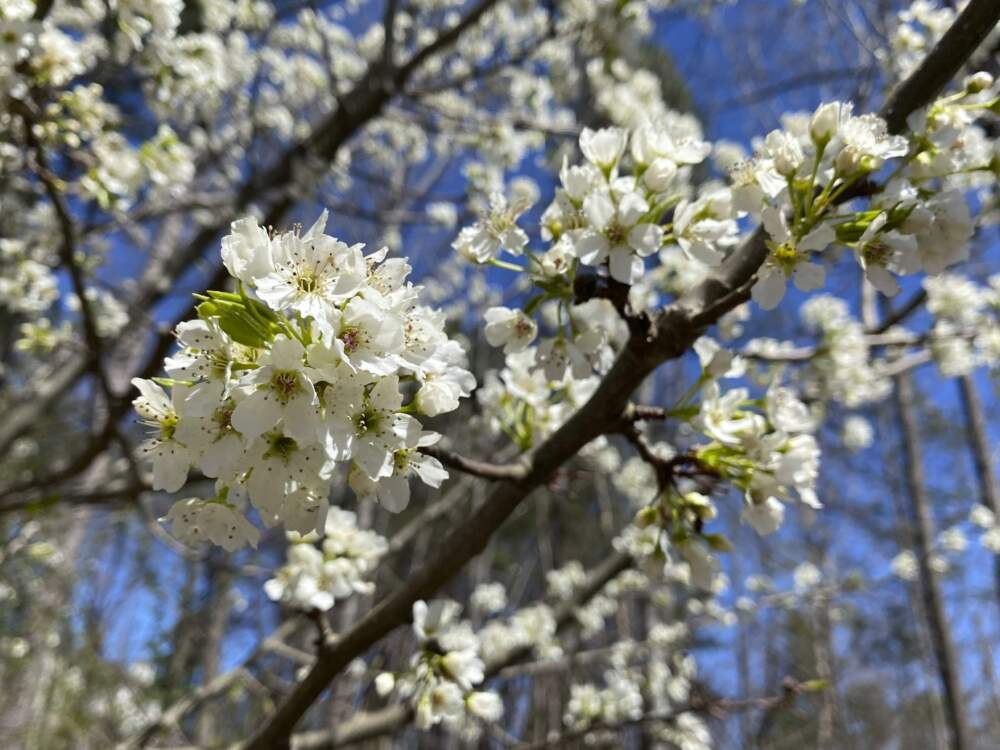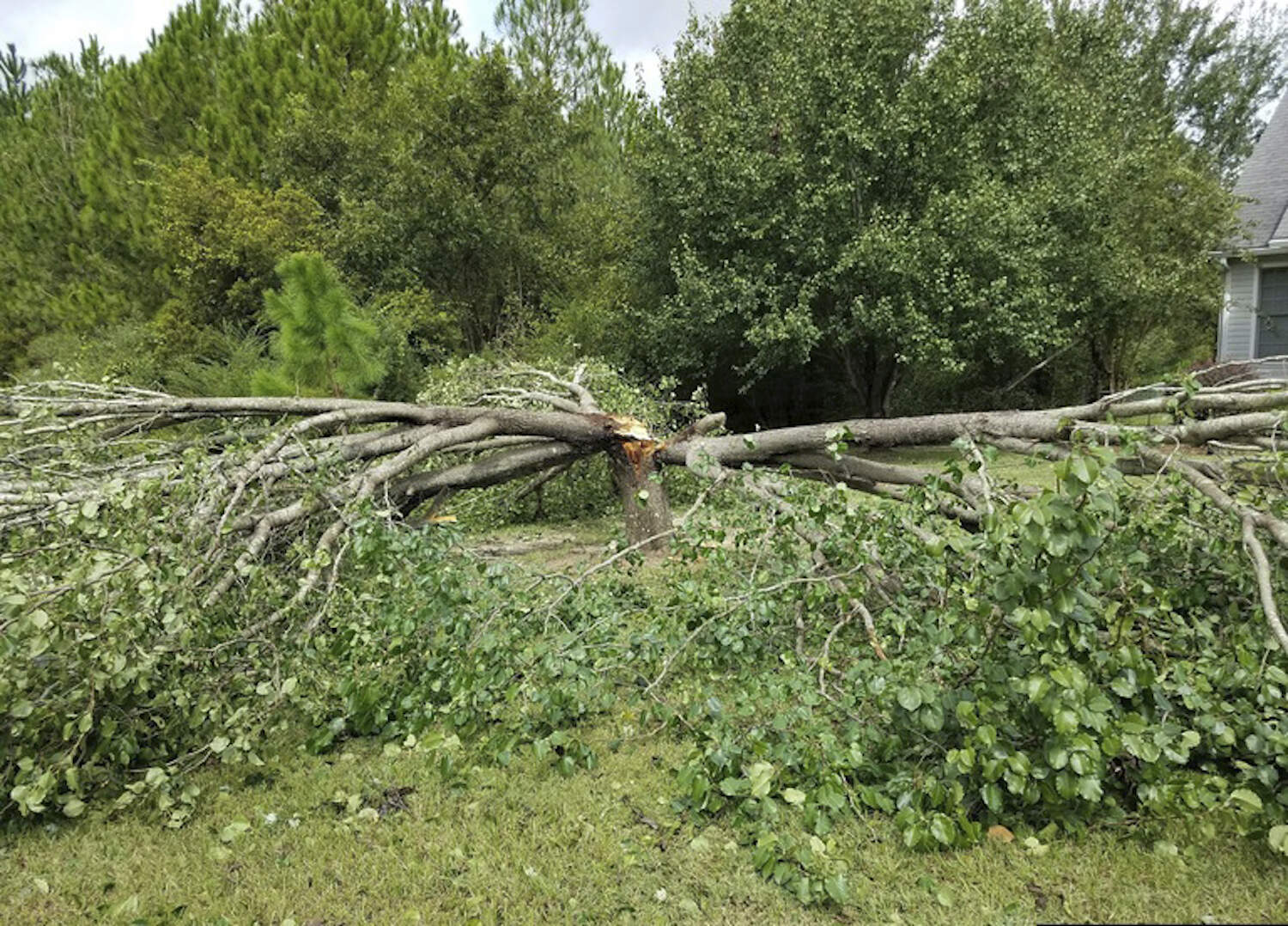Advertisement
Boston's Morning Newsletter
Why Mass. is moving to ban this pretty — but smelly — tree

Editor's Note: This is an excerpt from WBUR's daily morning newsletter, WBUR Today. If you like what you read and want it in your inbox, sign up here.
Welcome to Day 1 of the Drake Maye era. Before you review the tape with Bill Belichick, let’s throw it to the news:
The stink over this stinky tree: Massachusetts agricultural officials will consider a ban today on a type of tree found in many suburban neighborhoods. As WBUR’s Dan Guzman reports, the Callery pear tree (or Bradford pear tree) is well known for its gorgeous white blossoms — as well as a smell that’s been described as foul, fishy, pungent and distasteful. But that’s not why officials are holding a grudge. The reason for the potential ban is that the tree is an invasive species that crowds out other plants.
- Jennifer Forman Orth, a state environmental biologist, says the trees — which are originally from Asia — became popular in suburban developments in the 1950s. But within decades, problems arose when trees spread quickly in the wild. Older trees are a hazard, too, since they easily snap and fall due to wind or snow. Read more about their rise and fall here.
- What does the ban mean? Orth says they’re not asking people to remove the trees from their yards, “although it might be better for the environment if they did so.” Rather, the ban would phase the tree out of the nursery industry so it can no longer be planted. If approved, the ban is expected to take effect this summer.
- Zoom out: Three other states — Ohio, South Carolina and Pennsylvania — have already implemented similar bans.

Speaking of bans… Emerson College is banning further demonstrations in the Bolyston Place alleyway where a pro-Palestinian encampment was cleared overnight Thursday. After police clashed with protesters, the college says the move is intended “ensure campus safety.”
- Go deeper: Police arrested 108 protesters who were reportedly blocking pedestrian access and violating noise ordinances. Read more here about city officials’ mixed reactions to the arrests and a new encampment at Northeastern University.
- Zoom out: More than 500 people have been arrested across the country as pro-Palestinian protests roll on at colleges.
Bonk: Suffolk County District Attorney Kevin Hayden has agreed to pay a $5,000 fine for an ethics violation from his 2022 election. It stems from a press release Hayden’s office sent during the nasty Democratic primary, which amounted to using his public office for political advantage. (Hayden was interim DA at the time.)
- Zoom in: As WBUR’s Deborah Becker explains here, the press release aimed to discredit Hayden’s opponent in the race, then-Boston City Councilor Ricardo Arroyo, who was defending himself against resurfaced sexual assault allegations during his time in high school (Arroyo was never charged).
- Zoom out: Hayden is now the second official dinged for ethics violations during the 2022 Suffolk DA’s race. His predecessor, Rachael Rollins, resigned last year as the state’s U.S. attorney after a report found she used her office to try to help Arroyo.
Unrest on the rails: The MBTA is trying to head off a potential looming disruption — and not because of track work. The T’s board approved a one-year extension of its contract with commuter rail operator Keolis yesterday, as unionized coach workers, mechanics and car inspectors for the French company threaten to strike over wages. The T is hoping the extra money included in the contract extension could help Keolis meet some of the union’s demands. “We do believe this will assist,” MBTA General Manager Phil Eng said.
- The big picture: According to the union, Keolis pays its workers 12% less than what Amtrak workers paid, 16% less than Metro North workers and 11% less than New Jersey Transit workers.
- What’s next: The federal Railway Labor Act requires Keolis and the union to go through mediation to work on an agreement. According to Keolis, that means any potential strike would be “likely years away.”
But also… there’s track work: The partial Blue Line closure that has shuttle buses replacing service between Airport and Wonderland stations will continue through next Tuesday, two days longer than expected. Eng said crews need a little extra time to finish work — and hopefully lift 16 speed restrictions — across the five miles of track. Normal service is set to resume Wednesday morning.
- Reminder: The southern end of the Orange Line — between Forest Hills and Ruggles — will also be replaced by shuttles this weekend.
P.S.— Gov. Maura Healey and Mayor Michelle Wu are heading to an international climate conference next month. Where will it be? Take our Boston News Quiz and test your knowledge of this week’s stories.
